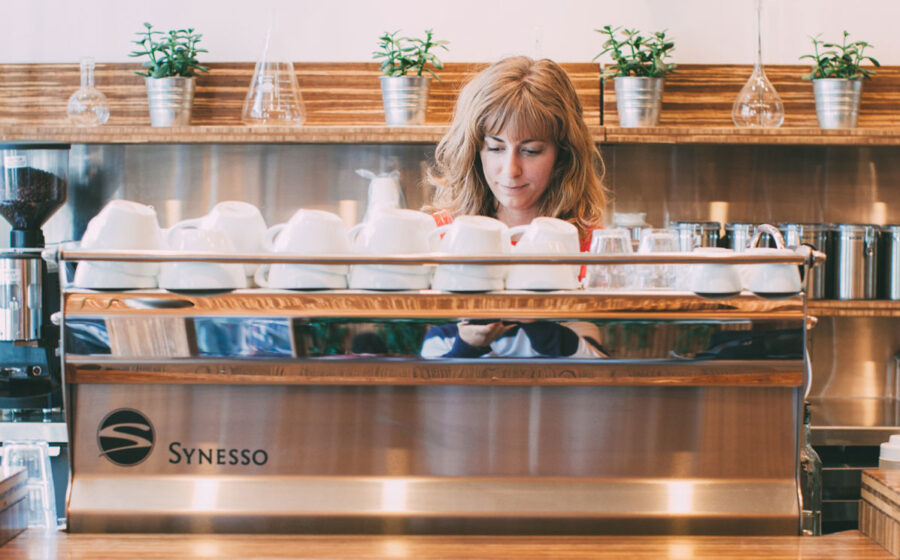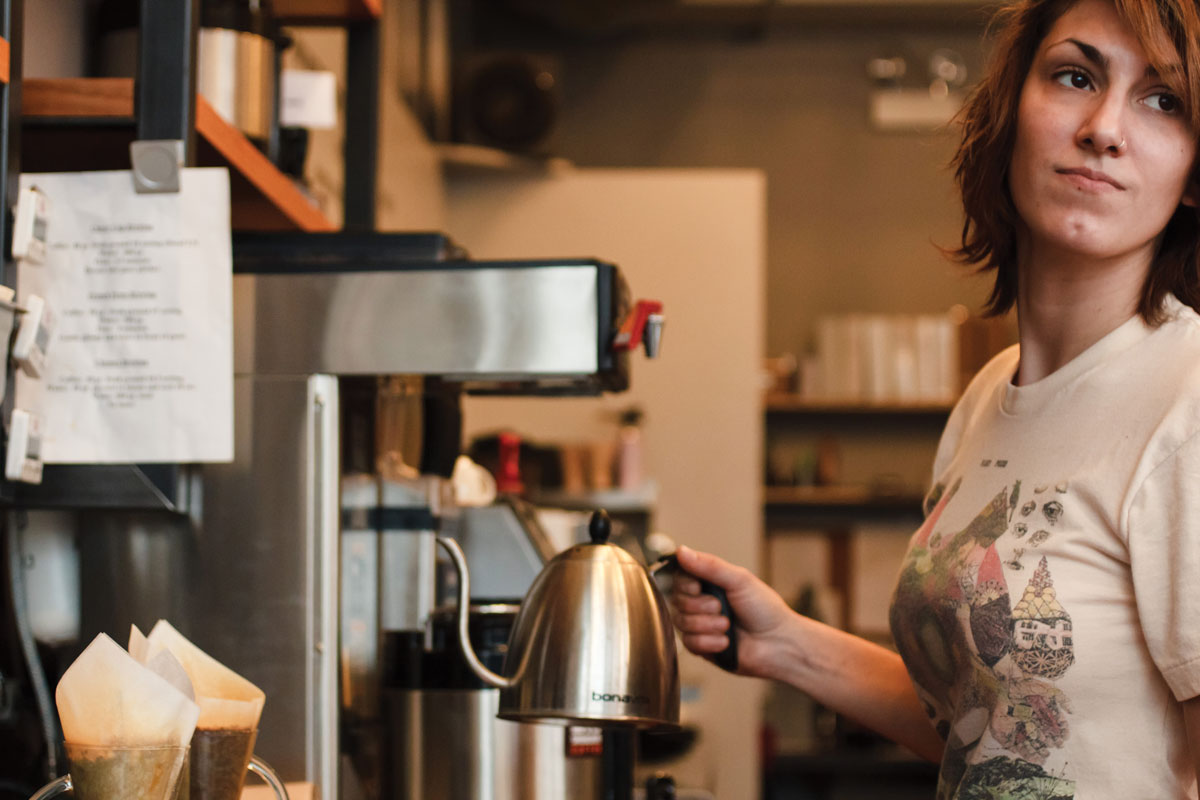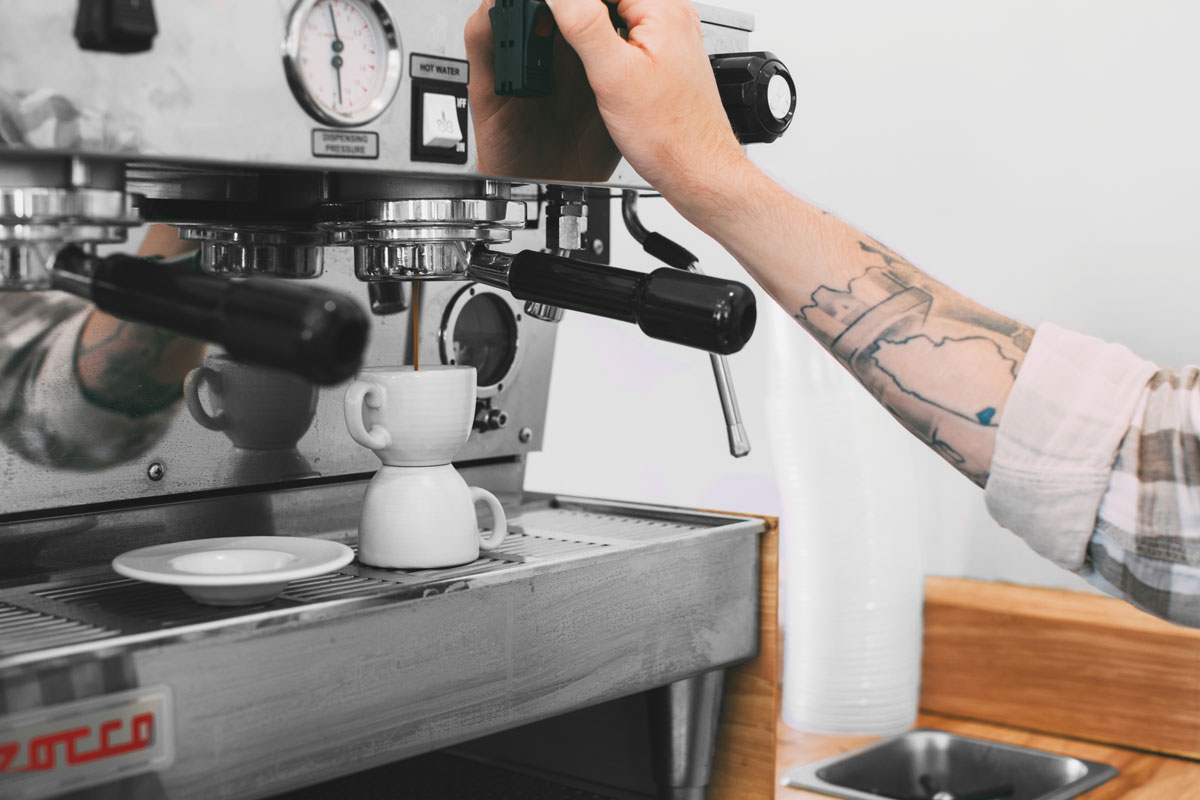[T]o consider Chicago is to consider its people. Chicagoans are hardy folk. They put up with cruel, seemingly endless winters, in a land that grays from November to March. They inhabit an expansive place—the third most populous city in the country, in the second largest county—one slow to traverse, and difficult to know. It takes effort and stamina to live in Chicago, and the motivated dwell there.
In his seminal 1914 poem “Chicago,” Carl Sandburg described the city as “fierce as a dog,” and dubbed it the “City of the Big Shoulders.” The determination Sandburg detailed in his epic ode runs deep through the city’s food and beverage culture, where a “from scratch” philosophy fuels a strong artisanal movement. First came the city’s trailblazing, now celebrity restaurateurs, then a wave of eager craft brewers. More recently, bolstered by the city’s now world-renowned food culture, third-wave coffee has laid its roots.
“In the thoughts of many who think about coffee, Chicago often gets overlooked.”
Those roots took years of cultivation and the hard work of many. As is true in many cities, appreciation for local, artisanal coffee has been slow to grow, and recognition wanting. “In the thoughts of many who think about coffee, Chicago often gets overlooked,” says Jenn Chen, a Chicago-based coffee marketer and digital strategist.
Within the scene, competition is growing, and things haven’t always been help-your-neighbor friendly. But true to the city’s good-hearted nature, Chicago third wave is now uniting, as throwdowns, collaborations, community cuppings, and even an upcoming “coffee track and field day” bring roasters, baristas, and enthusiasts together to celebrate the city and its hardworking brews.
In 1987, Chicago’s first Starbucks opened in the Loop, and the subsequent second wave saturated the city in non-discreet fashion, with Starbucks, Dunkin Donuts, and Caribou as ubiquitous there as El stops and Cubs apparel. But Midwestern work ethic and farm–to-table appreciation left room for more, and since Intelligentsia opened it’s first location in Chicago’s Lakeview neighborhood in 1995, the city has increasingly become a percolator for quality local coffee.

[T]hird wave was partly born in Chicago. Doug Zell and Emily Mange opened Intelligentsia when Stumptown Coffee Roasters was still just a glimmer in Duane Sorenson’s eye, and in North Carolina Counter Culture was less than a year into roasting. Another big roaster, Metropolis Coffee, entered Chicago in 2001. In the years since those companies’ foundings, a new generation of roasteries, a handful born in the last five years, have built a coffee culture in Chicago to rival that in any major metropolis.
“What’s great about Chicago is that we’re so diverse,” says Shannon Steele-Knuckles, head roaster and green buyer at Passion House Coffee Roasters, located in the city’s Fulton Market neighborhood. “You have people that work their butts off every day and make things happen, you have suburban people, you’ve got a mishmash of all different races.”
Chicago’s boroughs are many, each with defining character, and many with a community-centric shop or roaster. Some shops are defined by their locale—in Wicker Park, a neighborhood populated by younger artists, musicians, and fashionistas, The Wormhole Coffee caters to a generation that grew up on Back to the Future. There’s a DeLorean in one corner and eighties memorabilia gracing the walls.
Further west in equally hip (but less gentrified) Humboldt Park, Dark Matter Coffee shirks tradition and expectation with steampunk-esque roasters, a well-regarded barrel-aging program, and colorful branding. Big Shoulders Coffee, smack in the middle of three different transit lines, makes its bread and butter on batch-brew and omits latte art. In historically Swedish and family-filled Andersonville, the Coffee Studio keeps third-wave friendly and clean, with museum-like décor. The list goes on. Still, there’s room for growth. “The city itself has so many cultural and neighborhood pockets that you could easily find a coffee desert,” says Jenn, who is also director of web and social media for the New Gotham Coffee Community, an organization founded with the goal of unifying Chicago’s coffee professionals.
With so many “neighborhood pockets” being eyed by potential roasters, and a growing community spread wide across Chicago, the scene needed organizing.
With so many “neighborhood pockets” being eyed by potential roasters, and a growing community spread wide across Chicago, the scene needed organizing. New Gotham was founded in 2012 by current president Talya Strader, formerly of Intelligentsia and Bow Truss Coffee Roasters, to connect the scene’s separate parts, and ideally create a stronger whole. Jenn and Shannon are each board members, along with a roster of dedicated coffee professionals from across the city.
“I saw a need in my baristas to be a little more accepting of the coffee community,” says Talya. “That was at a time where stuff was starting to happen in North Carolina, and Thursday Night Throwdowns were starting. I thought that was a cool way to get everyone in the same room and make them be nice to each other.”
Today, says Jenn, “despite a pretty competitive wholesale environment, everyone is friendly.”
But more than reducing cattiness, New Gotham has built a foundation for a collaborative coffee community in Chicago, helping it grow by hosting throwdowns, roundtable discussions, and classes. New Gotham has opened communication between the city’s roasters and helped elevate baristas from workers to coffee professionals. In a city as big and spread out as Chicago, a unified network has been key to pushing coffee forward.
“There is a lot more sharing of roasters giving to other roasters freely,” says Talya. “Where as before we hoarded it like gold and only gave it out when we went to competition.”
“[Talya] has brought a lot of structure to connecting the coffee community through friendly competition,” says Tim Taylor, owner of Ipsento Coffee Roasters, a Logan Square café and roastery in the running for the 2014 America’s Best Coffeehouse competition.
“There is a lot more sharing of roasters giving to other roasters freely,” says Talya. “Where as before we hoarded it like gold and only gave it out when we went to competition.” While Chicago’s size makes collaboration more of a challenge (though one worth the effort), it also acts as an advantage to the expanding coffee scene. As Chicagoans take to local coffee as they’ve taken to local fine dining, spirits, and beer, they benefit from a widespread network of roasters, each offering a different perspective. “The city is large enough to support independent businesses that are doing their own thing,” says Kyle Hodges, “minister of propaganda” at Dark Matter.
In addition to the city’s homegrown, individualistic roasters, like Passion House, who categorize coffee in music terms “ambient,” “mainstream,” and “experimental,” or Bridgeport Coffee Company, third wave’s outpost on the South Side, Chicago is even large enough to support a raft of out-of-towners, like La Colombe, Stumptown, Colectivo Coffee Roasters and Counter Culture Coffee. Those big names have helped coffee spread from neighborhood to neighborhood, and helped educate consumers on the recent boom.
The common thread between them all isn’t just coffee, but Chicago coffee. There is down-to-earth camaraderie among Chicagoans that to many might look like Midwestern friendliness, but is really a kinship formed in winter, a collective determination to keep building. Says Tim from Ipsento, “I’ve had the privilege of collaborating with roasters from nearly every company in Chicago . . . we support one another, cup together, collaborate on equipment, and even buy green coffee together . . . there’s a good bit of camaraderie that we share as we try to collectively steer Chicago coffee.”
“The more the merrier,” says Big Shoulders founder Tim Coonan, who was inspired to name his business after Sandburg’s poem, the words of which grace his cafés walls. “Chicago, in spite of all of its well publicized problems, and it certainly has its share, is still the city that works. It’s awesome to be involved in that aspect of it. It will only be beneficial for all of us if that grows.”
An earlier version of this article said Talya Strader’s last name was Shrader.

















